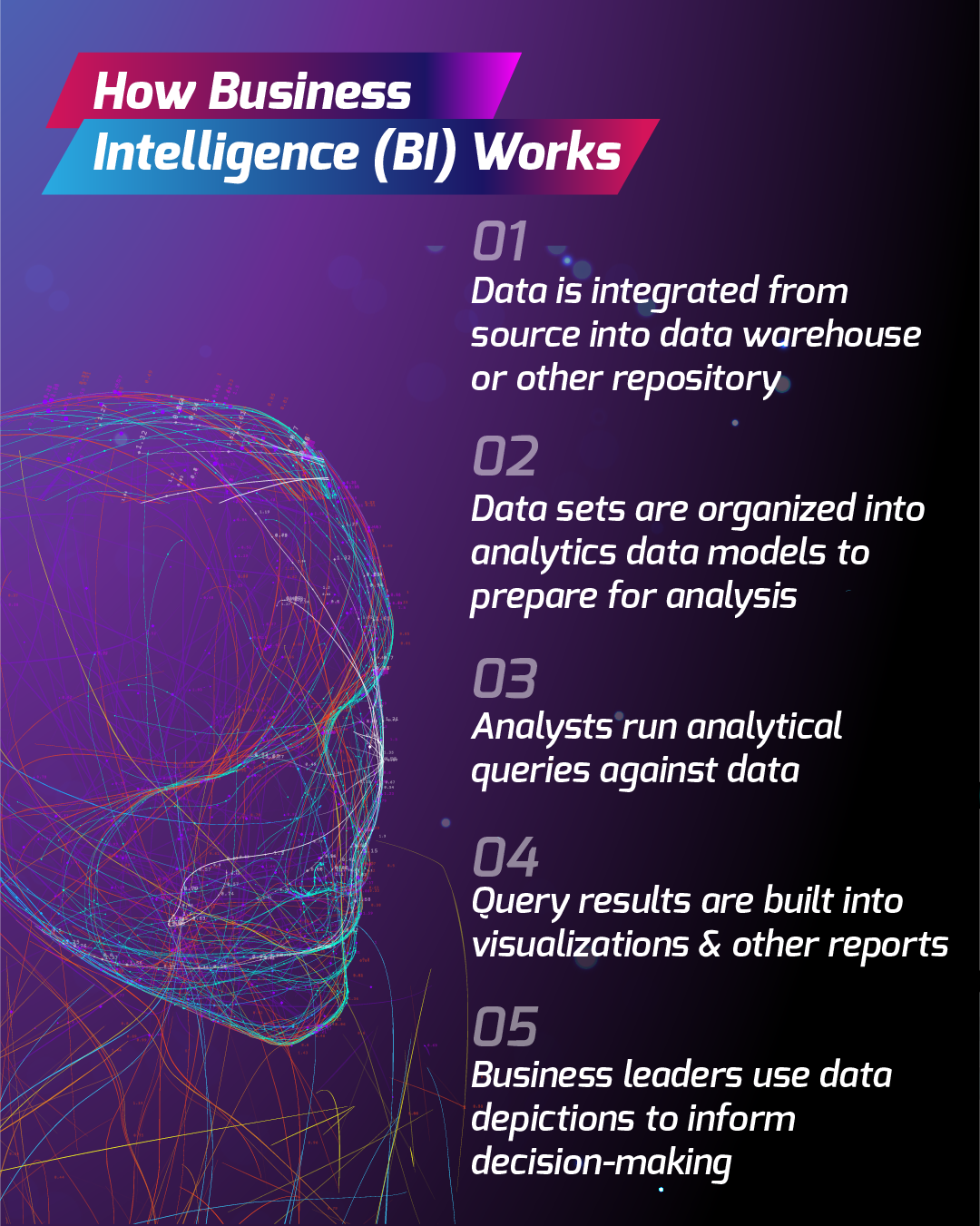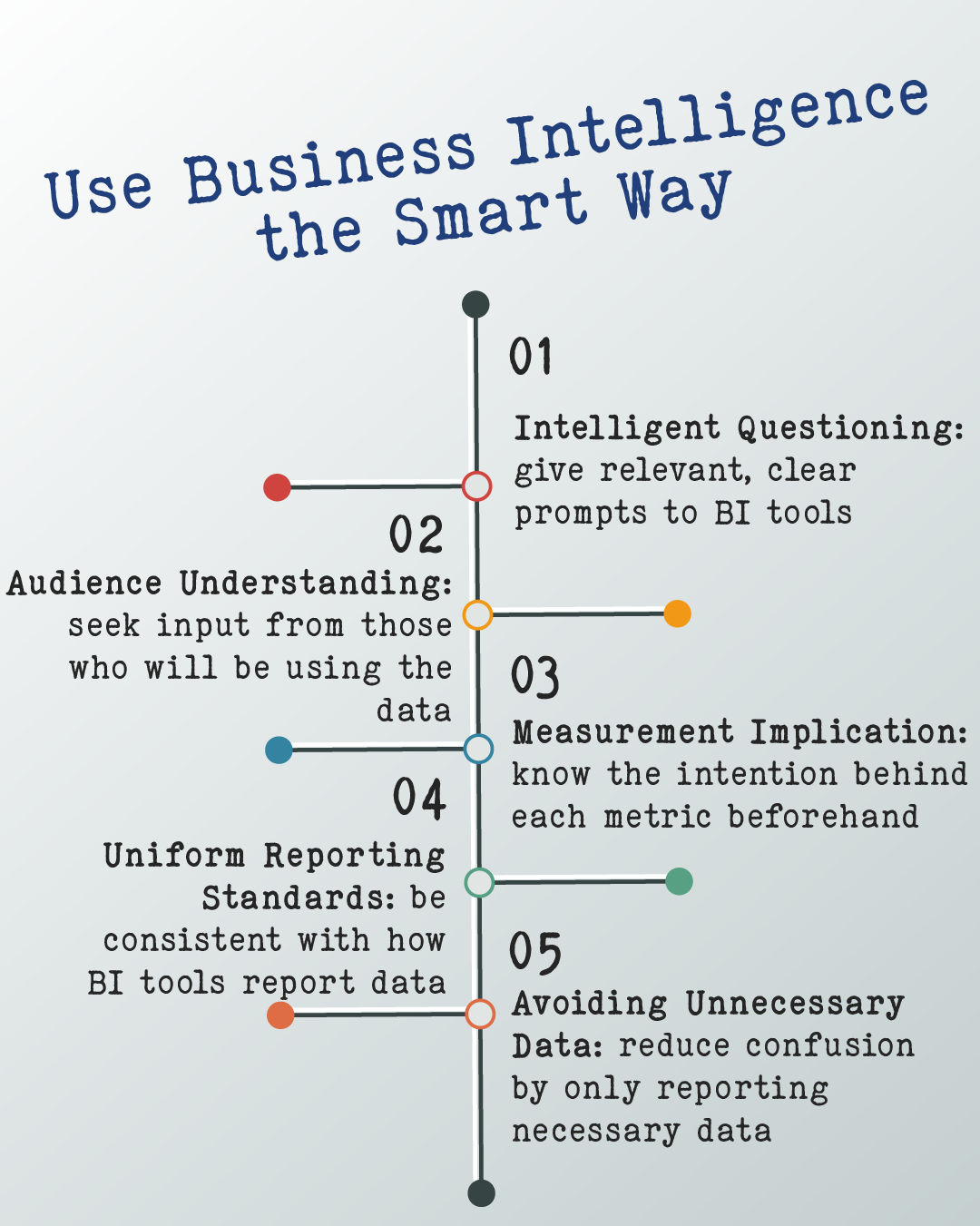So your company adopted the latest data analytics and visualization tools. The ones that can take a truckload of data from your company and transform it into a cool-looking report jam-packed with insights that resemble the ones published by the well-known, well-respected, super legit resources like McKinsey and Deloitte. The only problem: no one on your team, not even you, really knows what any of it means, let alone how to leverage these insights to drive business growth.
This is what happens when you let Business Intelligence take over and let yourself (and your brain) off the hook.

What is Business Intelligence (BI)?
If your company compiles, visualizes, and analyzes its data to make informed decisions, it uses Business Intelligence. And why wouldn’t it? The modern world of business runs on data. Who’s been the talk of the town for the past three years? Artificial Intelligence. And what makes Artificial Intelligence intelligent? Data. It uses heaps and heaps of data to make predictions and analyze possible outcomes. That’s what businesses do when they want to be intelligent.
[In search of the best data visualization tools? Check out this edition of The PTP Report.]
But is intelligence something companies have bestowed upon them by data and the tools that help make sense of it? Or is it something businesses need to make this stuff work?
What Makes Intelligence?
In 2023, Harvard University published a paper called “What Makes Us Smart?” The authors consult past research with a critical eye, questioning individualistic Western theories like the “Great Brain” theory of innovation, which emphasizes a single genius inventor rather than a culmination of collective thinking.
This is to say that breakthrough innovations and theories do not live in a vacuum. Perhaps one or two people execute the final product, but their ideas and methods are a culmination of a long history of other minds coming together to create new things and concepts.
To put it simply, advanced tools like AI and data analytics are not Great Brains, and when we treat them as such, they may make us dumber.
[Thinking of pursuing a career Data Science? Learn what makes this a great idea in this PTP Report.]

Building Business (Collective) Intelligence
If true intelligence derives from collective thinking, then the smartest way businesses can use BI is to leverage human intelligence among their team.
Want to leverage BI the smart way? Try these methods.
Intelligent Questioning
To get the best out of GenAI, it needs clear, informative, and relevant prompts. Similarly, BI requires asking the right questions to derive meaningful insights. If we simply let it spew out charts or reports without much guidance, anybody looking at them, even those who executed them, will likely be confused. Not very useful for making business decisions.
Audience Understanding
Always consider the audience of each report. If your BI is intended for a specific department, ask leaders in that department what information would be helpful for them. Without input from the audience, you may end up wasting important resources on meaningless charts whose only purpose is to look cool.
Measurement Implications
Think through the potential implications of any data metrics before presenting them to the team. Misaligned incentives can lead to unintended, unnecessary actions, such as making changes that are not a priority while actual needs go neglected.
Uniform Reporting Standards
Maintain consistency in data reporting to avoid misinterpretation. This may be something you can prompt tools to do for you, but even in your most dystopian of nightmares, never assume a machine can read your mind. For the front and back end, consider using a data glossary to standardize measures, formulas, and terminology.
Avoiding Unnecessary Data
Some data may be interesting but not practically useful. Avoid temptation to generate charts just for the fun of it. Rather, focus on actionable intelligence, eliminating “business trivia” to ensure reports are directly useful for decision-making.
Conclusion
Business Intelligence is only as intelligent as the people using it. By coming at it from a collective intelligence mindset, you can empower your team with informative, relevant insights your team can easily understand and implement into decision-making that drives business.
Is your company in need of data experts? PTP matches employers with top talent in Data Science and other emerging technologies like AI/ML, Cybersecurity, Cloud Computing, and more. Visit our services page here.





